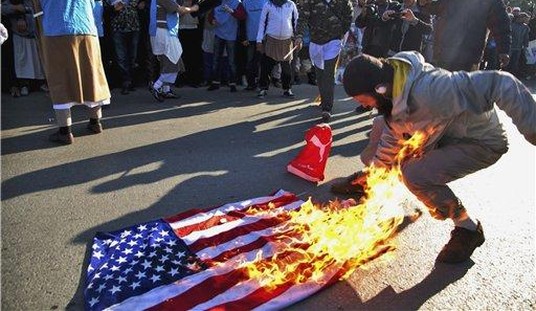President Barack Obama has basically regarded Prime Minister Benjamin Netanyahu as an instrumentality, and Tuesday’s joint press conference after their “make-up” meeting at the White House was no exception.
In general, Obama has treated Netanyahu as an instrumentality toward his own policy goal of creating a twenty-third Arab state and a second Palestinian state (in addition to Jordan), and Netanyahu — reversing lifelong opposition to Palestinian sovereignty in the West Bank and Gaza — has, since his key June 2009 speech, complied at least on the surface.
On Tuesday, though, Obama — whose rough treatment of Netanyahu got out of hand at their last meeting in March — needed Netanyahu for something else: refurbishing his “pro-Israel” credentials for the upcoming U.S. elections in November. Again, for Netanyahu, the junior partner, it was an offer he couldn’t refuse.
So not only Obama, but Netanyahu, too, ended up sounding the notes that could reassure Jewish supporters of the Democrats and disarm Republicans seeking to brand Obama as anti-Israel. The U.S.-Israeli bond is “unbreakable,” Obama said, and the meeting was “one more step in the extraordinary friendship between the U.S. and Israel, which has grown closer and closer as time goes on.”
Obama even added that “I’ve trusted Netanyahu since the first time I met him, before I was elected president. The press in Israel and the U.S. like to make up a story.”
Netanyahu chimed in by saying any rumors of troubled U.S.-Israeli relations were “dead wrong.”
Asked by a reporter about the imminent end of Netanyahu’s ten-month West Bank settlement freeze in September — seen as a likely point of friction — Obama skirted the issue, saying he hoped direct Israeli-Palestinian negotiations would get started “well before” the freeze expires. Netanyahu — that is, the new, Obama-friendly Netanyahu, who often sounds little different than the dovish Israeli leaders he used to criticize — averred a similar desire, saying that “[Palestinian Authority President Mahmoud] Abbas and I need to move to direct talks.”
Both leaders made only ginger references to the public culture of the purported peace partner, the Palestinian Authority — which is, in fact, steeped in hatred and delegtimization of Israel. Obama remarked that “it’s important that the Palestinians don’t look for excuses for incitement,” and Netanyahu made a desultory allusion to Palestinian “education and textbooks.” Both leaders, that is, toed the politically correct line of whitewashing the Palestinians. De rigueur, but still not an inspiring spectacle by the heads of government of the world’s last two fighting democracies.
Also in the Palestinian sphere, Obama praised Israel’s almost total lifting of its civilian blockade of Gaza — carried out under Obama’s pressure since the flotilla incident — as “real progress.” What gets left out is that this strengthens Hamas, a deadly enemy of both Israel and the U.S. But again, political correctness rules, and who are the U.S. president and the Israeli prime minister to flout it?
Israel’s most intense concerns, though, do not involve the Palestinian “peacemaking” charade but rather the nuclear issue. At the end of the Nuclear Non-Proliferation Conference in May, the Obama administration reversed longstanding U.S. policy by signing a concluding document that ignored Iran and threatened Israel’s presumed nuclear program.
But on Tuesday, in that connection, Obama was again sweetness and light: “[W]e believe that given its size and the threats against it, Israel has unique security requirements.” And: “The U.S. will never ask Israel to take steps to undermine it security interests. We are committed to Israel’s security.”
Translation: Even though we signed a document that threatens your nukes by calling for inspection of them — and of them alone, among all the presumed nuclear nations — we’re in favor of your nukes. Reassuring? Not really — for Israel, anyway, though pro-Israel Democrats may be another matter.
Even graver for Israel, though, is the Iranian issue. Obama called on Tehran to “cease its provocative behavior,” and claimed that “internationally the toughest sanctions ever have been put on Iran, in addition to [the U.S.’s] robust sanctions.”
Here Netanyahu allowed himself what sounded like a demurral, saying: “The biggest threat is Iran acquiring nuclear weapons. I appreciate the president’s work. I urge other leaders to follow us and pass tougher sanctions, especially in the energy sector.”
Which could be seen as a subtle note that evokes a darker undercurrent: namely, Israel is not really placated by the U.S.-orchestrated sanctions, sees them as too little and way too late, and sees the danger from Tehran continuing to grow.
Netanyahu, to repeat, is the junior partner. He had little choice but to go along with Tuesday’s public display of affection. It doesn’t necessarily mean they’re really such great friends.
The Palestinian issue is likely to stay mired, in any case, in the bitter enmity between Hamas-ruled Gaza and the Fatah-ruled Palestinian Authority, along with the weakness and low legitimacy of PA leaders Abbas and Salam Fayyad. The Iranian issue is something else again, and holds the real potential for Israel to break ranks with the U.S. No one in Israel actually believes in the sanctions, and the clock is ticking on the existential threat.









Join the conversation as a VIP Member